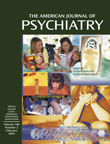Reduction of Nightmares and Other PTSD Symptoms in Combat Veterans by Prazosin: A Placebo-Controlled Study
Abstract
OBJECTIVE: Prazosin is a centrally active α1 adrenergic antagonist. The authors’ goal was to evaluate prazosin efficacy for nightmares, sleep disturbance, and overall posttraumatic stress disorder (PTSD) in combat veterans. METHOD: Ten Vietnam combat veterans with chronic PTSD and severe trauma-related nightmares each received prazosin and placebo in a 20-week double-blind crossover protocol. RESULTS: Prazosin (mean dose=9.5 mg/day at bedtime, SD=0.5) was superior to placebo for the three primary outcome measures: scores on the 1) recurrent distressing dreams item and the 2) difficulty falling/staying asleep item of the Clinician-Administered PTSD Scale and 3) change in overall PTSD severity and functional status according to the Clinical Global Impression of change. Total score and symptom cluster scores for reexperiencing, avoidance/numbing, and hyperarousal on the Clinician-Administered PTSD Scale also were significantly more improved in the prazosin condition, and prazosin was well tolerated. CONCLUSIONS: These data support the efficacy of prazosin for nightmares, sleep disturbance, and other PTSD symptoms.



